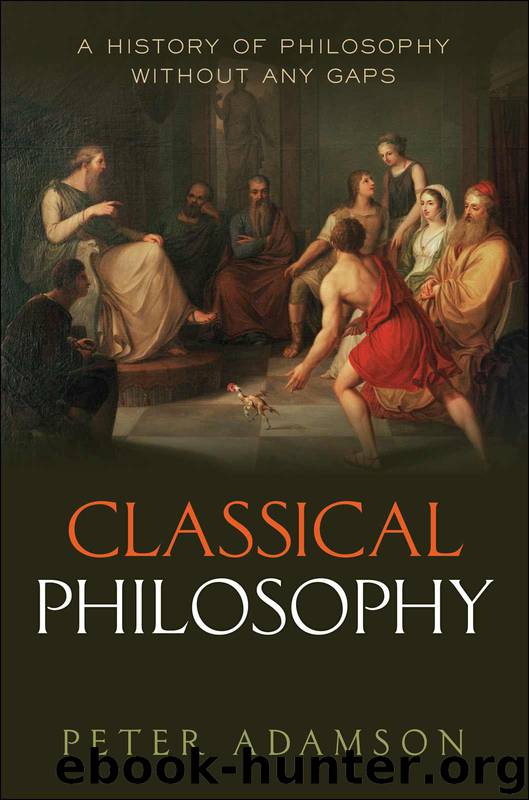Classical Philosophy: A history of philosophy without any gaps, Volume 1 by Peter Adamson

Author:Peter Adamson [Adamson, Peter]
Language: eng
Format: epub
Publisher: Oxford University Press
Published: 2014-05-10T00:00:00+00:00
25
WHAT’S IN A NAME?
PLATO’S CRATYLUS
In this book I’ve been emphasizing that Plato dealt with nearly all the topics philosophers have thought about ever since. I suppose even sympathetic readers will have the suspicion, though, that there are some significant issues in contemporary philosophy that don’t arise in Plato. What might these be? Here’s an obvious thought: since the work of the great logician and philosopher Gottlob Frege in the nineteenth century, philosophers in the analytic tradition have been extremely interested in language. This seems, in fact, to be a distinctive feature of twentieth-century philosophy in general: a fascination with language and problems about language. So how about philosophy of language, then? Is this an area where Plato has little to tell us, apart from his brief musings in the Sophist? Or is it yet another area where Plato is a pioneering genius, blah blah blah?
You may not be surprised to hear that it’s the latter. Plato may have been the first person to do philosophy of language, and he certainly authored the earliest work specifically devoted to the topic, a dialogue called the Cratylus. Of course this dialogue doesn’t tackle all, or even most, of the problems dealt with in contemporary philosophy of language. But it does tackle one of the most central problems: how do words have meaning? I’ll explain what the problem is, before looking at how Plato deals with it. If I utter a random string of syllables, like “gibbledobtank-furter,” that doesn’t mean anything. In some sense I haven’t even said anything—I haven’t produced a piece of language, so I haven’t managed to communicate. But if I say a word like “Frege” or “philosophy,” then I do communicate, at least to people who know what these words mean. So what exactly is the difference? How do some strings of noises, or symbols in the case of written language, come to have meaning, while others don’t? To answer this question is to explain how words get their power to communicate, and thus to establish something fundamental about what language is.
Nowadays, one popular theory about how words come to have meaning is that someone has to stipulate that a given sound or set of symbols will, from now on, represent some particular item. The most obvious example is naming: when a baby is on the way the parents confer with one another, and after overcoming bitter disagreement of the sort which makes each of them wonder if the other is going to be mature enough to raise a child, an agreement is reached. The baby gets a name. Mother and Father Frege dubbed their child “Gottlob” (maybe they should have thought about that one a bit more), and thus stipulated that this word would refer to the infant logician. So here’s a theory about how names, and words in general, get their meaning: it happens through an act of arbitrary dubbing, a “baptism,” if you will. As it turns out, this is one of the theories that Plato considers in the Cratylus.
Download
This site does not store any files on its server. We only index and link to content provided by other sites. Please contact the content providers to delete copyright contents if any and email us, we'll remove relevant links or contents immediately.
The Daily Stoic by Holiday Ryan & Hanselman Stephen(3325)
The Fate of Rome: Climate, Disease, and the End of an Empire (The Princeton History of the Ancient World) by Kyle Harper(3067)
People of the Earth: An Introduction to World Prehistory by Dr. Brian Fagan & Nadia Durrani(2739)
Ancient Worlds by Michael Scott(2690)
Babylon's Ark by Lawrence Anthony(2680)
The Daily Stoic by Ryan Holiday & Stephen Hanselman(2579)
Foreign Devils on the Silk Road: The Search for the Lost Treasures of Central Asia by Peter Hopkirk(2465)
India's Ancient Past by R.S. Sharma(2456)
MOSES THE EGYPTIAN by Jan Assmann(2417)
The Complete Dead Sea Scrolls in English (7th Edition) (Penguin Classics) by Geza Vermes(2283)
The Earth Chronicles Handbook by Zecharia Sitchin(2231)
Lost Technologies of Ancient Egypt by Christopher Dunn(2226)
24 Hours in Ancient Rome by Philip Matyszak(2085)
Alexander the Great by Philip Freeman(2065)
Aztec by Gary Jennings(2032)
The Nine Waves of Creation by Carl Johan Calleman(1919)
Curse Tablets and Binding Spells from the Ancient World by Gager John G.;(1862)
Before Atlantis by Frank Joseph(1858)
Earthmare: The Lost Book of Wars by Cergat(1825)
